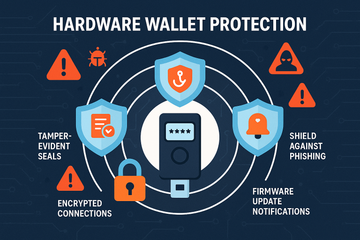Picture this: you’ve just tucked away your digital assets into what you believe is an impenetrable vault—a hardware wallet. You might think it's the Fort Knox of cryptocurrency storage, but is it really invincible? Let’s get to the bottom of it and see how these trusty devices stack up against potential threats.
Let’s Get Technical: What Exactly Is a Hardware Wallet?
In case you're new to the party, a hardware wallet is a physical device designed to securely store the private keys to your blockchain fortress. You’ll find brands like Trezor and Ledger leading the charge, creating devices that make your keys virtually unhackable—at least, that’s the idea.
These devices keep your private keys offline, making them less susceptible to online threats. It's a bit like keeping your savings in a fireproof safe rather than under a digital mattress. But does that mean they're invincible? Let's explore some scenarios.
The Dreaded Supply Chain Attack
Imagine you’ve ordered your new hardware wallet, awaiting its arrival like a kid on Christmas morning. But what if, somewhere along the supply chain, someone decided to gift you a Trojan horse instead? Yes, it's a rare occurrence, but if bad actors tamper with the device before it reaches you, they could preload it with malicious software.
Hardware wallet manufacturers have taken massive steps to counter these risks. They employ tamper-evident seals and unique packaging, so you can spot if something seems off right out of the box.
Are You Gonna Let a Man-in-the-Middle Attack Bother You?
You know those sneaky eavesdroppers you see in movies? This attack is a bit like that. Someone might manage to intercept the communication between your device and the host computer. Sounds daunting, but here’s some good news: modern hardware wallets don't transmit private keys. They ensure these sacred codes never see the light of day, making the impact of this attack pretty minimal.
However, it’s still wise to use a secure, trusted computer to manage your crypto. After all, you wouldn't want someone listening in on your secrets, would you?
Physical Attacks—Like a Burglar in the Night
Then there’s the smash-and-grab scenario—someone literally stealing your device. These wallets have safeguards in place against this kind of brute force attempt. You might feel like you’re in a spy movie when you hear about self-destructing secrets, but it’s real: failed login attempts can wipe the device clean, keeping thieves from cracking it open like a treasure chest.
Although it sounds as secure as a knight in shining armor, the reality is that determined attackers may use specialized equipment to steal your information. It might take a ton of skill and resources, but where there's a will, there's often a way.
Firmware Flaws
Hardware wallets, like any tech, come with their share of software—often considered the Achilles’ heel. If firmware isn’t up to date, it might be vulnerable to exploitation. Here's the thing: always make sure your device has the latest updates. It’s like keeping your guard up against new threats that keep popping up.
Manufacturers like Ledger release regular updates, so staying in the loop is as easy as keeping your apps updated and your passwords strong.
A Fair Warning: Social Engineering
You’ve probably heard of phishing—a timeless trick where attackers convince you to hand over your keys without even realizing it. It’s less technical, more psychological. The magic here is in not falling for those ‘urgent’ emails prompting you to spill the beans on your private info.
In situations like these, it’s all about skepticism. When something feels too urgent or off, double-check with official sources. A simple pause and an extra question could be the difference between safety and insecurity.
So Is Your Hardware Wallet Safe?
Let’s wrap this up: no lock is entirely unbreakable, and hardware wallets aren’t exempt from potentially having vulnerabilities. But they do go a long way in keeping your digital treasures safe and sound, especially when you consider all the inherent security features.
While hardware wallets may not be bulletproof against the most determined bad actors, they are an excellent step in securing your crypto assets—just like how a good lock can discourage the average home invader. And remember, a lot depends on how you, the user, handle and maintain your devices.
Keep Learning and Stay Cautious
Stay informed, keep your firmware updated, and always be on the lookout for suspicious activity. Consider it your armor in the ever-evolving landscape of digital finances. As long as you maintain vigilance and embrace security practices, you’ll likely have little to fear from the remote possibility of your hardware wallet being compromised.











